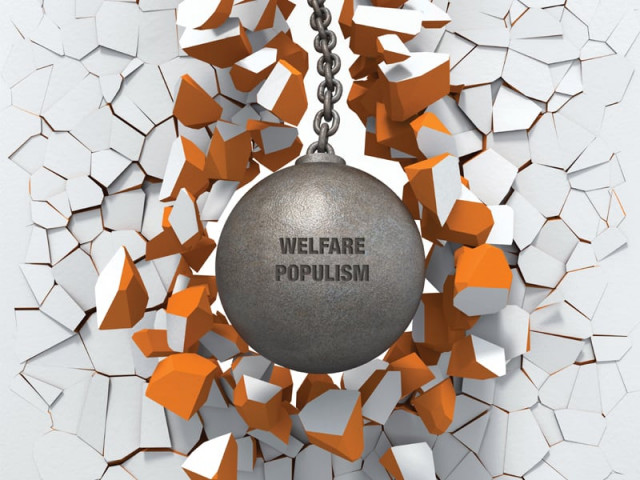Handle with care: How welfare populism destroys prosperity
Lessons for Pakistan from around the world.

Welfare populism not only destroys economy, it also destroys basic human values of pride, self-respect and hard work. DESIGN: ESSA MALIK
Around 1905, Argentina was the sixth largest economy in the world, ahead of the US. Then, successive governments consumed by welfare populism brought down the economy, pushed people to poverty and jeopardised democracy in around 50 years.
Around 1980, Greece was a star of Europe with a healthy growth rate. Successive governments, bent upon doling out welfare by pledging the future of its citizens, led to what is Greece today. It, together with Italy and Spain, threatens the entire euro region.
More recently, Thailand had emerged as the largest exporter of rice in the world. However, a welfare government, which took charge in 2011, decided to provide a support price 20-30% higher than the market price to its farmers. In just two years, Thailand lost its leadership position in the world, making its rice expensive than its competitors.
Indonesia used to export its surplus oil until it decided to give subsidy on fuel prices to its citizens. The demand for fuel went considerably high, contributing to an increase in the traffic density. In a short span of time, Indonesia, from an exporter of oil, has become a net importer of oil.
What are the lessons for Pakistan?
As the popularly elected government nears elections, it is likely to take such actions, or likely to avoid decisions, which may hurt its prospects of re-election. For instance, discontinuation of privatisation programme since 2006 and reinstatement of thousands of contract employees as permanent government servants constitute welfare populism.

Reluctance to impose agriculture income tax by all provincial governments provides another example. Excessive currency printing to keep the money circulation high is also welfare populism. A couple of years ago, the Punjab government started ‘sasti roti’ scheme as a glaring example of how bad economics and bad politics converge. More recently, the apex courts have also joined the bandwagon of welfare populism by fixing prices of commodities.
Provision of price ceiling does not help the poor, it only helps those who can have easier access to products and it hurts the producers badly, who may not only lose their business but also cause further unemployment.
When you once made your people accustomed to welfare populism, they always demand more of it. Obviously, resources will always be limited and hence ultimately the government fails to continue. At this point, not only economic growth stalls, but also government and entire political system become threatened.
Thus, bad economics is also bad politics. And as various examples show, one does not have to even wait for the infamous long term to see the bad days.
Welfare populism ultimately destroys economy, which should be well understood. It also destroys basic human values of pride, self-respect and hard work. Consider how Greek citizens have refused to respect any austerity measures. As welfare populism needs a large government, it gives rise to authoritarianism and tyranny. Thus, welfare populism also disrupts the bedrock of economy ie democracy.
I hope that the reform-minded politicians across the political divide would choose responsibility over victory, otherwise, if they win on the basis of irresponsible actions or false promises, they will be soon thrown out. The jinni of welfare populism, when once out of the bottle, refuses to be capped again and often eats its own master.
The writer is managing partner of economic research firm Development Pool and is a founding member of Economic Freedom Network Pakistan
Published in The Express Tribune, December 31st, 2012.
Like Business on Facebook to stay informed and join in the conversation.


















COMMENTS
Comments are moderated and generally will be posted if they are on-topic and not abusive.
For more information, please see our Comments FAQ